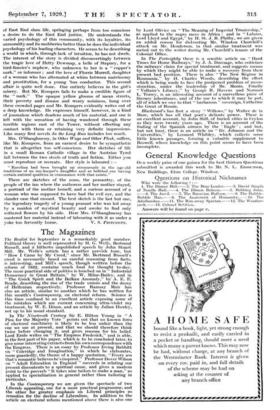The Magazines
The Realist for September is a remarkably good number. Political theory is well represented by H. G. Wells, Bertrand Russell, and a hitherto unpublished speech by John Stuart Mill. Mr. Wells's article has a rather peevish tone, but How I Came by My Creed," since Mr. Bertrand Russell's creed is necessarily based on careful reasoning from facts, is interesting, and Mill's speech, though written before the reform of 1832, contains much food for thought to-day. The more practical side of politics is touched on in Industrial Democracy in Great Britain," by W. Milne-Bailey, and in " The Greek Spirit and the Balkan Anomaly," by A. E. E. Reade, describing the rise of the trade unions and the decay of Hellenism respectively. Professor Ramsay Muir has also an article, similar to another which he has written for this month's Contemporary, on electoral reform. Science is this time confined to an excellent article exposing some of the mistakes which are current concerning ultra-violet ray treatment, by W. E. Dixon, and an article by Julian Huxley, not up. to his usual standard.
In The Nineteenth Century Sir E. Hilton Young in " A Plea for the Majority Vote ' points out that no known form of electoral machinery is likely to be less unfair than the one we use at present, and that we should therefore think twice before changing it, and gives reasons for his belief. Lord Ernie writes on The Empress Frederick," and is able, in the first part of his paper, which is to be concluded later, to give some interesting extracts from his own correspondence with the Empress. There is an essay by Professor Irving Babbitt on " Coleridge and • Imagination," in which he elaborates, more guardedly, the theme of a happy quotation, "Every ass that's romantic believes he's inspired. Professor Dover Wilson on " Adult Education in England " succeeds in relating our present discontents to a spiritual cause, and gives a modern point to the proverb "It takes nine tailors to make a man," as applied to Specialization in general rather than tailoring in particular.
In the Contemporary we are given the spectacle of two Liberals appealing, one for a more practical programme, and the other for greater emphasis on Liberal principles • as remedies for the decline of-Liberalism. In addition to the article on electoral reform mentioned above there is also one by Lord Olivier on " The Meaning of Imperial Trusteeship," as applied to the negro races in Africa ; and in " Labour, Lord Lloyd and Egypt," by H. St. J. B. Philby, we are given an added reason for distrusting Mr. Winston Churchill's attack on Mr. Henderson, in that similar treatment was meted but to the writer during Mi. Churchill's tenure of the Colonial Office.
In The Fortnightly there is a sensible article on " }lard Times for Home Railways," by J. A. Dunnage, who criticizes the railways' claim for special treatment, and suggests means by which they might be able to make a recovery from their present bad position. There is also " The New Regime in Roumania," by H. Charles Woods, describing the effort which is being made to face the postponed problem of recon- struction, under the leadership of Mr. Maniu. Finally " Voltaire's Library," by George R. Havens and Norman L. Torrey, is an interesting account of a marvellous piece of literary inheritance, and of the use to which it may be put, all of which we owe to that " barbarous " sovereign, Catherine the Great of Russia.
Blackwood's has first a story " Willows," by Walter de In Mare, which has all that poet's delicate power. There is an excellent account, by John Still, of buried cities in Ceylon as they were twenty years ago. There is an account of the finding of the Spanish airmen by the ' Eagle' ; and last, but not least, there is an article on Dr. Johnson and the Universities," by Leonard Whibley, which collects some little known passages, forming a valuable supplement to Boswell, whose knowledge on this point seems to have been incomplete,
































 Previous page
Previous page